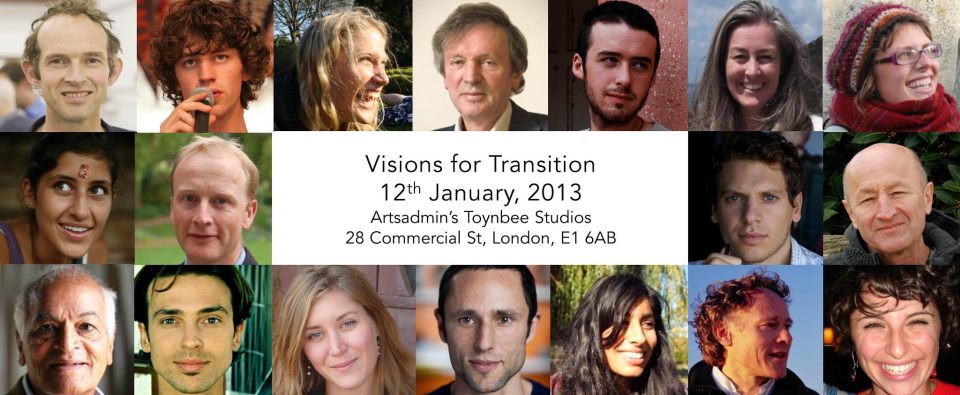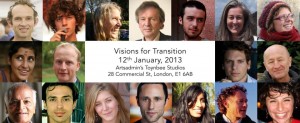Visions for Transition
Three remarkable young women unite to stage TEDx Whitechapel – a one-day conference proffering powerful inspiration for creating a more beautiful and sustainable world
Standing on a platform before a forest of trees, storyteller Ben MacFadyen tells the mythical story of Atlas – born of his mother Gaia, the Earth – to take care of the world she had created.
Assigned by Zeus to carry the weight of the heavens on his shoulders, Atlas bore a heavy burden, the story tells, as sadly he watched the Earth below him change, with humans cutting trees and poisoning rivers, not listening to the messages of their ancestors.
“And today we have filled our streets with lights and music so we can’t hear the secrets of the Earth,” bemoans the storyteller. “Like Atlas, we all carry this weight inside us, and our failure to listen to the Earth can bring destruction, climate change and war.”
Like its stirring opening story performance – the TEDx Whitechapel conference held in London’s East End earlier this month (at Toynbee Studios on Commercial Street, E1) – was an invitation to feel the pain and sadness of our severed connection with the Earth and to be inspired to reconnect, to heal, and to co-create a beautiful world going forward.
TEDx relates to TED – the celebrated nonprofit organisation devoted to ‘Ideas Worth Spreading’ which started out as a four-day conference in California 25 years ago before mushrooming and going on to support innumerable world-changing ideas and initiatives for action. An annual TED Conference in Long Beach, California is attended by leading global thinkers (to date including Bill Gates, Richard Branson, Al Gore and Elizabeth Gilbert) who speak for 18 minutes and their talks are made available as free inspiration on TED.com. The TEDx format provides a way for individuals or groups to organise local events around the world, as with this one-day conference in London.
TEDx Whitechapel hosted ten top international pioneers for new consciousness – including legendary ‘Earth Pilgrim’ Satish Kumar, investigator of ancient mysteries Graham Hancock, maverick scientist Rupert Sheldrake, and ‘Ecocide Lawyer’ Polly Higgins. Talks by these speakers were interspersed with stunning theatre, art and music performances to stimulate a deeper understanding of the issues and solutions explored. Performance highlights included the Feral Theatre’s poetic multimedia story showing the world through the eyes of a bird, the curlew, on the edge of extinction; and a masterful musical act by multi-instrumentalist Cosmo Sheldrake, who presented – equipped with keyboards and laptop – what he called an “interspecies collaboration” featuring sampled owl noises in a radical symphony of raps, beats and awesome natural sounds.
The TEDx event was orchestrated by three dynamic and inspirational young students. Amrita Bhohi, Stefanna Bosse and Jennifer Tessler are all friends sharing the conviction that the existing systems and institutions governing our world have failed to produce an ecologically sustainable, socially just and spiritually fulfilling world. Standing at a critical point in history, their idea to put on TEDx Whitechapel began with a search for inspiration, as Jennifer (a student at Sussex University) explains:
“We came across the ideas of many outstanding visionaries who were boldly pioneering a new way forward. They were challenging existing thinking, and responding to the challenges with courage, creativity and compassion. We began to see that with the collapse of the old, is the unique opportunity to create new pathways and align with what is most precious and sacred. We knew we wanted to support these individuals to share and spread their ideas, focus on solutions, and in doing so to catalyse the transition to co-create a more beautiful world. We believe that TED is a great medium for achieving this, as talks can be watched online for free and spread fast internationally.”
“Nature – the greatest teacher”
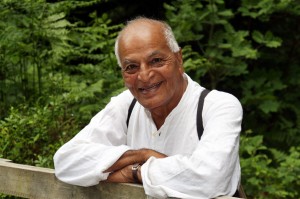 Fittingly – valiant Eco pioneer and former Jain monk Satish Kumar, editor of Resurgence & Ecologist magazine, was the first speaker to take to the stand and ‘catalyse the transition’. Standing barefoot on the earth, atop a small grass oratory platform provided centre stage – the forest of trees behind him – Satish highlighted the importance of ecology, of living in harmony with the land and observing nature, and of living from the heart; all things too often overlooked in modern education, he said.
Fittingly – valiant Eco pioneer and former Jain monk Satish Kumar, editor of Resurgence & Ecologist magazine, was the first speaker to take to the stand and ‘catalyse the transition’. Standing barefoot on the earth, atop a small grass oratory platform provided centre stage – the forest of trees behind him – Satish highlighted the importance of ecology, of living in harmony with the land and observing nature, and of living from the heart; all things too often overlooked in modern education, he said.
He recounted the story of his recent visit to the London School of Economics (LSE), where he was concerned to find environmental education overlooked. “I asked them, ‘Where is your department for ecology?’ – Satish mused. “ ‘Ecology and economy come from same word, we are all related and connected – ecology equals management, it’s how we make this planet Home.’ ”
Satish lamented that graduates all over the globe are released into the world without understanding how to manage ecology, yet he championed Bhutan as a notable exception. “In Bhutan there is a new education – it’s not about GDP, but GNY – Gross National Happiness,” he delighted. “We should be less concerned with teaching our students about poverty and economy, and focus on how we can live well on this planet Home and how to be happy. That is what all colleges in the UK and around the world need to learn.”
He advocated that graduates leaving university should, rather than seek a job, actively create their own job. “Jobs and employment squash your creativity and you end up following the orders of the company and the boss, allowing little chance to be yourself,” he said. “Better to have a livelyhood that is from your heart, creating and making something that inspires you.”
And Satish stressed the fulfilment and wellbeing that comes from working on the land and manual labour. “Make something with your hands, they are instruments of alchemy,” he enthused – “ transform base material into something extraordinary. Labourers and farmers puts seed into ground and it’s transformed into something beautiful, created from two hands, yet we teach people how to use computers and mobile phones in schools. Better they should use their hands and feel their heart. And how to relate to a tree? In awe and wonder, observing a miracle seed produce a miracle tree, ripening in the sun. Observing nature is no longer deemed important in schools.”
Satish said that Nature was the greatest teacher in life, even greater than Buddha, who after all, became enlightened under a Bodhi tree. “Hand, Heart and Head – the three H’s of education,” he concluded, “not reading and writing. This is the new way of education.” He disappeared from the stage through the forest of trees, to roars and ripples of applause.
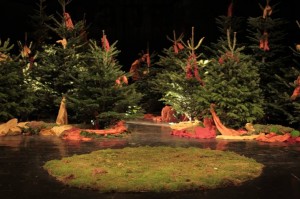 The reconstructed forest on the stage at this conference served to express TEDx Whitechapel’s deep love of nature and their wish to protect it for future generations. “Like yogis, our speakers will emerge from the forest to share their wisdom with us,” the organisers explained on the event’s website. Saffron coloured fabric woven around the trees represented the power of compassionate communities to forge a better world – a design inspired by a Buddhist ritual in which monks’ saffron robes are wrapped around the trees to protect them.
The reconstructed forest on the stage at this conference served to express TEDx Whitechapel’s deep love of nature and their wish to protect it for future generations. “Like yogis, our speakers will emerge from the forest to share their wisdom with us,” the organisers explained on the event’s website. Saffron coloured fabric woven around the trees represented the power of compassionate communities to forge a better world – a design inspired by a Buddhist ritual in which monks’ saffron robes are wrapped around the trees to protect them.
“The ceremony is used to symbolically remind people of the interdependence between the conditions of our natural world and human existence and of the sacredness of all life,” the TEDx Whitechapel event brochure explained. “The trees used for the stage are remnants of the Christmas period and will all be recycled after the event.”
“The Land of the Living Dead”
The next speaker to emerge from the trees was legendary eco warrior Tim ‘Mac’ Macartney. Echoing both the story of Atlas and the wisdom of Satish, Mac also extolled the importance of reconnecting with the Earth. He dramatically recounted his experience of a Native American ceremony where he was kept in an underground chamber for seven days in preparation for his anticipated visit to the place they called ‘The Land of the Living Dead’. Releasing him from the secluded chamber, the Native Americans ultimately delivered Mac to a shopping mall – ‘The Land of the Living Dead’.
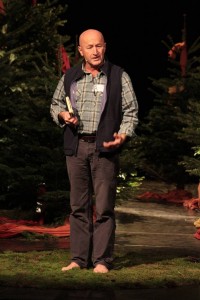 “Before you get too superior Mac,” they told me, “before you implore you are so different, open your heart to what it is to be disconnected from life and from the Earth. Bring people back to the Mother. We have lost each other and you have lost yourself. Do not be embarrassed to speak of what you love. Be the warrior of the open heart.”
“Before you get too superior Mac,” they told me, “before you implore you are so different, open your heart to what it is to be disconnected from life and from the Earth. Bring people back to the Mother. We have lost each other and you have lost yourself. Do not be embarrassed to speak of what you love. Be the warrior of the open heart.”
Years later, Mac went on to found Embercombe, an eco-community in Devon exploring new ways of living in harmony with the land. Here, he once hosted a mixed race aboriginal elder who had been evicted from his homeland Ulluru (Ayers Rock) in Australia, by the government, causing him existential loneliness and ‘the agony of separation’. “His family was all the rocks and trees of the land next to Ulluru,” Mac said. “He would say, ‘Where is my Ulluru?’ How do we get back to Ulluru?”
And how do we get back to Ulluru? Mac posed the question. “I stand on the edge of a forest. These trees that stand behind me – we have known of their sacredness for thousands of years. The Tree of Life is falling back and some trees are dying. How can we find our way to a more beautiful world if we don’t learn to love deeply, have the courage in our hearts to speak up, to stand and be soft and gentle and more with the trees?”
Mac said the trees were our teachers, teaching us about community and connectedness. “As we step into our future, I feel it’s of pivotal importance that we remember the indigenous voices of our past saying, ‘Grow your brilliance, train your mind, find knowledge and open your hearts so you can feel your feet on the Earth and know she loves you and that you truly belong.’ ”
“Dare to be Great”
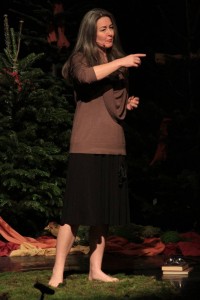 It was while walking in the forest barefoot in the rain on her last birthday, that ‘Ecocide Lawyer’ Polly Higgins felt inspired, like Mac, to “grow her brilliance” and to encourage others to do the same. So she revealed when her time came to stand on the grassy TEDx speakers’ pulpit.
It was while walking in the forest barefoot in the rain on her last birthday, that ‘Ecocide Lawyer’ Polly Higgins felt inspired, like Mac, to “grow her brilliance” and to encourage others to do the same. So she revealed when her time came to stand on the grassy TEDx speakers’ pulpit.
“Taking off my shoes and walking with nature, I challenged myself with questions about what to do next with Earth Law and to help overcome ecocide,’ she said. “And the thought came to me from the lands of beautiful fecundity, ripe with life – ‘Dare to be Great’. It took my breath away. I decided to try to be the best I can with the skills I have in service to a force greater than myself. And from here, I deduced it was less about me and more about empowering others to ‘Dare to be Great’.”
Polly encouraged the members of the audience to dare to be their unique selves and to help co-create a new world. “I feel a magic happening here today,” she said. “How can we move from a place of dependency to a place of interdependency? How can we create a world of peace? How can I dare to be great? Not just standing on a platform but facing my shadow self and asking those questions that I may be scared to ask. I ask you to dare to be great too.”
The many other excellent talks at this TEDx event are too numerous to incorporate into this article, including those by ‘Sacred Economics’ writer Charles Eisenstein, eco business leader Patrick Andrews, activist David Graeber, artist-writer Raoul Martinez and sexual health educator, Ella Lauser.
However – a fine example of a man who has faced down his shadow side and dared to be great, is leading consciousness explorer Graham Hancock, whose talk at this TEDx conference blew the audience away. Graham, author of a number of bestselling books investigating ancient civilisations, experienced a powerful spiritual awakening while communing with the legendary shamanic plant medicine of the Amazon, Ayahuasca.
Plant Wisdom
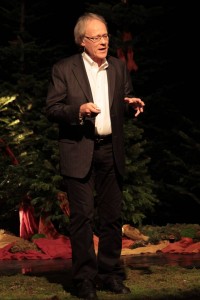 In his talk, Graham explained how the emergence into consciousness among humans was started by shamanism and visionary plants like Ayahuasca. He spoke of the encounters with entities that were typically experienced by users of Ayahuasca, most commonly with ‘Mother Ayahausca’ herself whom he said had an interest in the evolution of humans and corrects our behaviour. He said Ayahuasca rescued people from harmful addictions. She had, he candidly expressed, brought an end to his own cannabis habit, which after 24 years, had become a destructive force in his life
In his talk, Graham explained how the emergence into consciousness among humans was started by shamanism and visionary plants like Ayahuasca. He spoke of the encounters with entities that were typically experienced by users of Ayahuasca, most commonly with ‘Mother Ayahausca’ herself whom he said had an interest in the evolution of humans and corrects our behaviour. He said Ayahuasca rescued people from harmful addictions. She had, he candidly expressed, brought an end to his own cannabis habit, which after 24 years, had become a destructive force in his life
“Ayahuasca said this was not serving me,” Graham said, “and was leading me to behave in negative ways. She gave me a big kicking and put me through an ordeal. I was shown my death if I continued as I was. She took me to hell, it was like the judgement hall of Osiris. I was shown the path I was walking would lead me to face annihilation beyond death. I have never smoked cannabis since and I am now much more productive, creative and efficient. I have made myself a more positive and loving person. This was made possible by my encounter with death.”
Graham relented our society’s rejection of visionary and altered states, and criminalisation of hallucinogens like Ayahuasca, which he believes could be a crucial catalyst for positive human evolution. “And yet we use depression pills to alter consciousness and tea, alcohol and sugar,’ he marvelled. “Industries are built around these things. A society based on this consciousness is not working and we need to find something to replace it. In the Amazon, rainforests are cut down for hamburgers – it’s an insane state of consciousness. And with the Iraq war – six months of expenditure could compensate the Amazon forever.”
Graham said the shamans of the Amazon believe we’ve severed our connection with spirit, echoing once more the conference’s key message of our dire human need for ‘reconnection’.
“Ayahuasca is a medicine to bring about a change in consciousness, he said. “To help us find balance and harmony with the universe. Growth and perfection of the soul is why we are human in the first place. We have the right for adult sovereignty over our consciousness including the decision to choose to use plants. We allow the rot but not this chance which could be damaging our future evolution.”
Walking away through the trees, Graham was serenaded by riotous applause, many in the audience rising to their feet.
The power of interdependence
Following TEDx Whitechapel, I ask the organisers – leading agents of change for the new generation – what they learnt from the event and how they planned to apply it in their lives. Their answers are a shining example of the power of co-creation and interdependence, both potent themes emerging from the conference.
“The experience of TEDx Whitechapel has been a living example of ‘anything is possible’ when we come together with a shared belief, vision and commitment,” said Stefana Bosse (a Masters degree student at Columbia University, New York). “It wasn’t always easy, and probably nothing worth fighting for ever is. You need dedication, passion and enthusiasm to translate into an energetic drive to push things forward, but just as much you need patience and adaptability, because as hard as you may try, things won’t always go the way you wished or planned.
“Most importantly however was that being best friends, we had a space of love and trust, in which it was ok to make mistakes, to not be perfect, where we could share our concerns and frustrations. Communication, trust and love were absolutely key in working through challenges together, they are crucial to the success of any great project. None of this would have been possible if any of us had tried to do it individually, it was a true team effort, and testament to what beautiful things are possible when you work for a vision that is greater than you, your self and your ego.”
“And it is especially great when you get to do it together with your best friends,” added Amrita Bhohi (a postgraduate student at Schumacher College in Devon). “The experience confirmed to us this intrinsic knowledge that if you believe in something, and you have the courage to take that leap, jump into the unknown and dedicate yourself to it fully, you really can make your dreams become a reality.”

